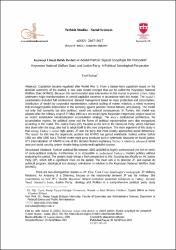| dc.contributor.author | Subaşi, Erol | |
| dc.date.accessioned | 2023-01-12T08:07:40Z | |
| dc.date.available | 2023-01-12T08:07:40Z | |
| dc.date.issued | 2021 | en_US |
| dc.identifier.citation | Subasi, E. (2021). Keynesian National Welfare State, and Justice Party: A Political Sociological Perspective. Turkish Studies - Social Sciences, 16(2), 735-759. http://doi.org/10.47356/TurkishStudies.45824 | en_US |
| dc.identifier.issn | 2667-5617 | |
| dc.identifier.uri | http://doi.org/10.47356/TurkishStudies.45824 | |
| dc.identifier.uri | https://hdl.handle.net/11436/7418 | |
| dc.description.abstract | Capitalism became regulated after World War II. From a laisser-faire capitalism based on the
absolute autonomy of the market, a new state model emerged that can be called the Keynesian National
Welfare State (KNWS). Because this recommended state intervention in the market to prevent crises, states
underwent major transformations in central capitalist countries in accordance with this model. The model’s
caracteristics included full employment, demand management based on mass production and consumption,
distribution of wealth by corporatist representation, national scaling of market relations, a mixed economy
that envisaged public intervention in the economy against possible market failures, and planing. The model
not only had economic but also political, social and cultural consequences. In Turkey, this model was
adapted after the military coup of 27 May 1960 as a pro-social rights Keynesian Hegemonic project based on
an import substitution industrialization accumulation strategy. The state’s institutional architecture, the
accumulation regime, the political scene and the forms of political representation were also reorganized
according to the model. The Justice Party (JP), founded as the heir to the Democrat Party, which had been
shut down after the coup, also had to adapt itself to this new conjuncture. The main argument of this study is
that among Turkey’s center-right actors, JP was the party that most closely approached social democracy.
The reason for this was the hegemonic position that KNWS has gained worldwide. Indeed, neither before
1960 nor after 1980 has a Turkish centre-right party produced such a systematic discourse on social justice.
JP’s internalization of KNWS is one of the decisive factors explaining Turkey’s relatively advanced social
state and social security system despite being a peripheral capitalist country. | en_US |
| dc.language.iso | eng | en_US |
| dc.rights | info:eu-repo/semantics/openAccess | en_US |
| dc.title | Keynesian National Welfare State, and Justice Party: A Political Sociological perspective | en_US |
| dc.type | article | en_US |
| dc.contributor.department | RTEÜ, İktisadi ve İdari Bilimler Fakültesi, Siyaset Bilimi ve Kamu Yönetimi Bölümü | en_US |
| dc.contributor.institutionauthor | Subaşi, Erol | |
| dc.identifier.volume | 16 | en_US |
| dc.identifier.issue | 2 | en_US |
| dc.identifier.startpage | 735 | en_US |
| dc.identifier.endpage | 759 | en_US |
| dc.relation.journal | Turkish Studies - Social Sciences | en_US |
| dc.relation.publicationcategory | Makale - Uluslararası Hakemli Dergi - Kurum Öğretim Elemanı | en_US |


















